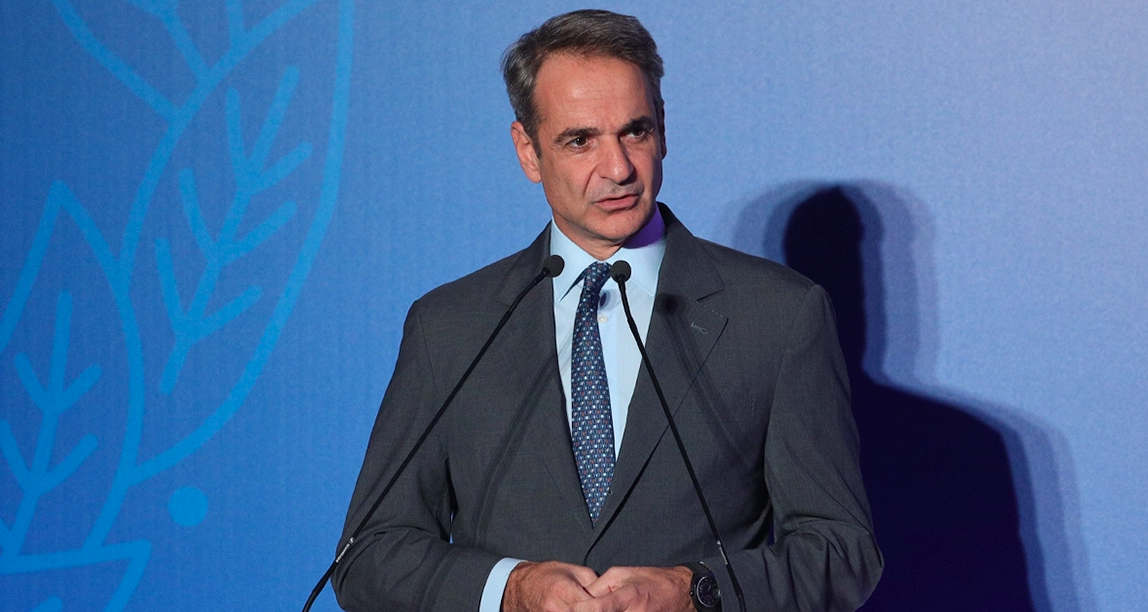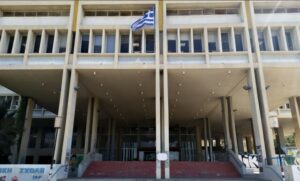A package of actions with a three-year implementation horizon that will attempt to put industry – and manufacturing in general -, research and innovation at the top of the agenda and will also serve as a critical bridge after the Recovery Fund expires, is being presented by the Prime Minister at a special event Kyriakos Mitsotakis and Development Minister Takis Theodoricakos.
The plan, which moves in the direction of the productive transformation of the economy, is expected to mobilize about 8.5 billion euros for investment.
Watch live
The Minister of Development stated that the 2010s were a decade of significant trials due to the economic crisis and waves of populism that delayed the exit from that crisis.
He referred to the economic achievements of the Mitsotakis government, including the rapid decline in unemployment and the highest growth rates in the EU.
“The international image of the country has decisively improved, as evidenced by significant investments from Pfizer and Microsoft, a 41.7% increase in exports, and a 25% rise in industrial production. By 2028, GDP is expected to reach 133% of its current level, while inflation is also projected to decrease,” noted Mr. Theodorikakos.

He emphasized that “our challenge is the productive transformation of the country. This requires a focus on industry and the effective utilization of Greece’s advantages to contribute to the development of all regions.”
“It is a shared concern of all to revive the border regions of the country. This is a national necessity that this government is committed to serving. If we do not succeed in this, the effectiveness of our development may be called into question,” he stated.
Mr. Theodorikakos explained that the plan is based on three pillars: First, improving the business environment by reducing bureaucracy. Second, developing financing tools for investments. Third, providing new incentives for increased innovation and research.
Full Speech of the Minister of Development
“Honorable Prime Minister,
Honorable former Prime Minister,
Mr. Governor of the Bank of Greece,
Honorable Vice Presidents of Parliament,
Ladies and gentlemen ministers, deputy ministers, and MPs,
Honorable regional governors,
Ladies and gentlemen general secretaries,
Mr. President of SEV,
Ms. President of SVE,
Esteemed rectors,
Esteemed representatives of production entities,
Ladies and gentlemen,
I would like to thank everyone present, especially the Prime Minister, who, despite his particularly busy schedule, is here with us today, highlighting the importance and priority of the Government for our country’s new productive model. I also thank my fellow ministers, the members of Parliament, the regional governors, the representatives of production entities, and the rectors for their significant contributions to today’s presentation, stemming from the initial stage of our consultation process.
The 2010s were a decade of great trials for the Greek economy and society, marked by the deep crisis caused by public debt and waves of populism and demagoguery, which we must not forget, delaying the exit from the crisis.
The 2020s—under the New Democracy government with Prime Minister Kyriakos Mitsotakis—are characterized by a return to normalcy, fiscal responsibility and credibility, reforms, tax cuts, improvements in the investment climate, regaining investment grade, and restoring the Greek economy to the markets.
This policy has reduced unemployment from 17.5% to below 10%, with growth rates reaching 2% from 2019 to 2023, and currently at 2.3% in the second quarter of 2024, making it one of the highest rates in the European Union. The minimum wage has seen a 27% increase in recent years.
Over the past five years, Greece has transformed into an energy hub in the southeastern Mediterranean and a key player in the European Union’s energy security and green transition, thanks to prudent geopolitical and economic choices. The country’s international image and presence have decisively improved, facilitating the attraction of investments, as exemplified by the significant investments made by Pfizer and Microsoft.
All this occurred amid a triple crisis during the first four years: the pandemic, waves of illegal migration, and the severe consequences of the climate crisis that also impacts Greece. In a region rife with wars and turmoil, our country stands as a pillar of stability, peace, and reliability to all, especially our partners.
In the medium term, growth rates of around 2.3% are projected for 2025, and debt is expected to decrease, aiming for a reduction of 20 percentage points by 2028, reaching 133% of GDP. Additionally, as a government, we aim for a further reduction and stabilization of inflation around 2%. Notably, food inflation, which was 10.4% last October, has now fallen to 3%. Today, major supermarket chains have announced price reductions of 6% to 15% on 120 essential products, following the reductions we achieved in school supplies last September.
Our objective is to turn this decade into a period of successful productive transformation of the Greek economy, strengthening the industry and increasing productive investments.
Thus, our goal is to achieve development for all, with productive growth everywhere—sustainable and viable. Development requires investments, facilitation, and support for entrepreneurship, along with continuous adaptation to the green and digital transition.
This way, the quantitative growth of the economy will be accompanied by a decisive boost in productivity and the distribution of GDP growth through a more productive and outward-looking economy—one that can leverage research, innovative products, and high-value-added services that can access large international markets. A crucial target is the further reduction of the trade deficit, which has decreased to 14% of GDP. Over the past five years, exports of goods and services have increased by 41.7%, while industrial production has risen by 25%.
The productive transformation of the Greek economy is essentially a fundamental prerequisite for achieving the dual goal outlined by the Prime Minister for this four-year term: to bridge the income and living standards of Greeks with the average of European citizens while simultaneously reducing regional, intra-regional, and social inequalities.
This should become a comprehensive vision for our society and our country—for all: politicians, entrepreneurs, local governments, workers, and citizens in every corner of Greece—and should translate into a very specific plan with a timeline, targeted measures, and policies, making it a national goal.
A key characteristic of this plan is to strengthen industry, as it contributes to making our economy more resilient to crises and stabilizing the trajectory of growth. Industry is the economic activity with the highest productivity and the least environmental footprint.
The new productive model means we want to be competitive globally to multiply our exports. In this context, we urgently need research and technology to be integrated into the products and services we produce, leading to new comparative advantages for Greek production. Significant work is being done in the 14 research and technology institutes that we want to connect even more with our industry.
Productive transformation means recognizing the value of work relative to consumption as a primary and dominant contribution to the national product. We must instill the value of creativity in younger generations. Emphasizing industry does not mean we do not support other sectors of our economy, such as tourism, which has an exceptionally significant impact on the Greek economy. We will continue to work for the quantitative and qualitative strengthening of our tourism sector.
In fact, under the existing development law of 2022, investment proposals in tourism are included with guaranteed funding of €300 million. The results of these investments will be published in the next two weeks. Additionally, approximately 50% of subsidies for investment plans under previous development laws are directed towards tourism.
The new productive model of the economy leverages Greece’s advantages and those of each region individually, contributing to balanced regional development. Each region must have its own plan for productive reconstruction, as the needs and potential differ across regions like Crete, the Dodecanese, and the Cyclades, compared to Thessaly, Thrace, the Peloponnese, and Macedonia.
It is a shared concern and expectation for all of us to revive the villages and towns of the countryside, especially in border areas. We aim to keep young people in their communities with jobs that provide them with joy and pride in their work and success, enabling them to establish families there.
This is a national necessity that this government seeks to fulfill with even more accelerated efforts in the second half of this decade. It will, of course, relate to the key findings of the Draghi report on EU competitiveness and investments in industry and technology. If we do not achieve this, the resilience of our development may be questioned in the future.
Ladies and gentlemen, in discussions with production entities, especially representatives from the industry, the primary challenges identified include energy costs, labor shortages, bureaucracy, and infrastructure.
Productive transformation means effectively addressing these issues with a well-defined plan and persistence. You are all aware of the Prime Minister’s battle concerning energy costs in Europe.
Simultaneously, our national strategy for the new productive model is articulated alongside our strategies for industry, spatial planning and the environment, research and innovation, demographic challenges, infrastructure, the primary sector of our economy, education, and training. We maintain a close, creative partnership with the Minister of Labor for technical training programs for thousands of young people in technical professions where there is a market shortage. Our cooperation with ministries and colleagues corresponding to these strategies is continuous and constructive.
In this context, a government committee for industry is being established.
As the Ministry of Development, in collaboration with production entities, we are implementing and immediately specifying the national strategy for industry. We are focusing on critical sectors such as the vertically integrated agri-food processing sector—supported by the €600 million package announced by the Prime Minister at the Thessaloniki International Fair—the pharmaceuticals and cutting-edge biotechnology, production of renewable energy equipment and energy efficiency, circular economy, shipbuilding and repair, software applications, artificial intelligence, as well as defense industry and robotics, and product research
Ask me anything
Explore related questions





